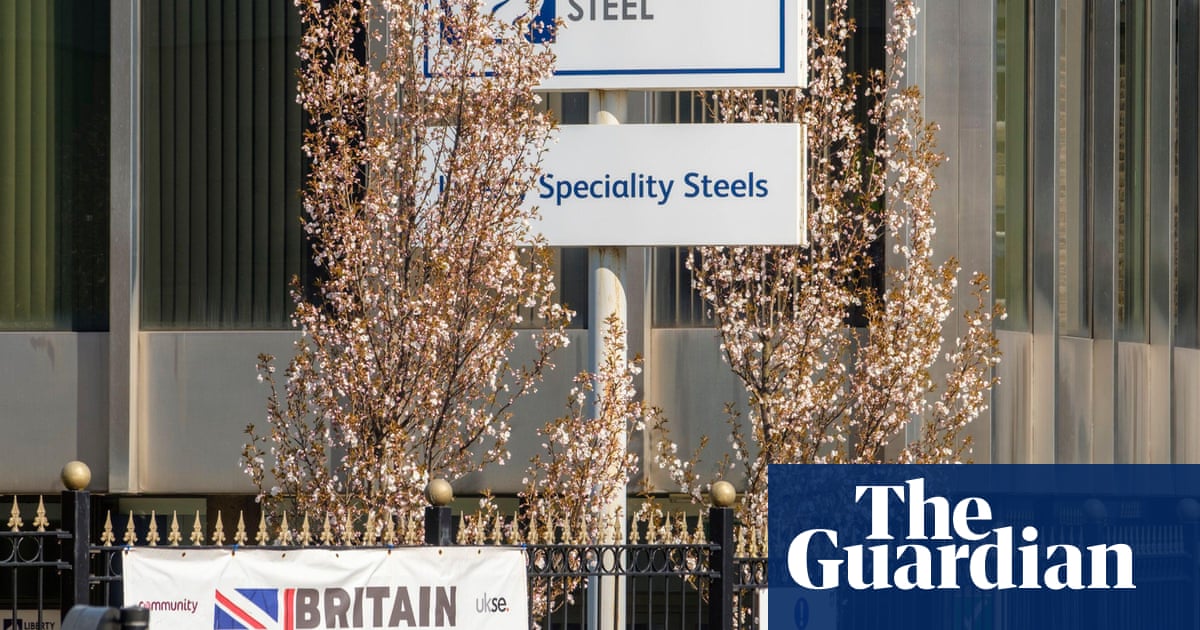Liberty Steel’s operations in SouthYorkshirelost £340m in four years, according to figures that shine a light on the difficulties facing a business on the brink of liquidation that employs 1,450 people.
The company, owned by the metals magnateSanjeev Gupta, is desperately searching for investors or lenders before a 16 July deadline, after London’s high court granted it extra time last week.
Its South Yorkshire subsidiary includes an electric arc furnace atRotherham, plus steelworks in Stocksbridge and Brinsworth. Court documents suggest that previous efforts in 2022 to sell the latter two sites to an unnamed venture capital fund or a “Chinese conglomerate” came to nothing.
The Guardianrevealed last weekthat the Rotherham plant and a similar operation in Motherwell, Scotland, have not produced any steel for about nine months because of a lack of funds to buy vital materials, with staff on furlough on 85% of their salaries.
The depth of the crisis has prompted Community, the biggest union representing steelworkers at the plants, to write to Gupta, a Dubai resident, asking for assurances of his ability to continue to run his businesses in the UK. If Gupta is unable to do so, the union “will be forced to demand that you step aside”, according to a letter seen by the Guardian from the general secretary, Roy Rickhuss.
The UK steel industry is under severe pressure, with 2024 production slumping to the lowest since the 1930s. The government passed emergency legislation in April totake control of British Steel’s two blast furnacesat Scunthorpe to prevent up to 2,700 jobs being lost within days.
Another crisis is brewing at Liberty Steel, with some industry figures expecting the government to step in to ensure the plants keep running if they fall into liquidation – although it is not thought that the government will give financial support to Gupta’s companies.
Liberty Steel companies, grouped under Gupta’s informal GFG Alliance, have not filed accounts since 2021, when the group was plunged into turmoil by the collapse of the lenderGreensillCapital. Investors who backed Greensill are now seeking to recover $4.5bn (£3.32bn) lent to Gupta’s businesses.
Gupta has in recent months lost control of a series of his businesses around the world, including Liberty Steel’s eastern European companies, theWhyalla steelworks in South Australia, and his metals trading business in the UK. At the same time, the UK’s Serious Fraud Office is investigating suspected fraud, fraudulent trading and money laundering related to GFG’s financing with Greensill.
Gupta’s ownership of the South Yorkshire operation – formally known as Speciality Steel UK (SSUK) – is also under threat, after a supplier issued a winding-up petition over unpaid debts, and a company plan to write off debts related to Greensill failed.
That process gave a rare insight into the finances of Liberty Steel. Documents disclosed in court showed deep losses since March 2020 at SSUK, albeit with a slight improvement up to March 2024 as the company focused on higher-value aerospace and defence products for companies including Rolls-Royce and Airbus.
However, the hiatus at the Rotherham site since last July means losses are likely to have risen again.
Sign up toBusiness Today
Get set for the working day – we'll point you to all the business news and analysis you need every morning
after newsletter promotion
In December, the company submitted to the court that it was insolvent, and would face compulsory liquidation if the restructuring deal failed. It is “considered likely that a ‘special manager’ would be appointed” by the government’s official receiver, the company said, as happened in 2019when British Steel fell into liquidation.
Jeffrey Kabel, Liberty Steel’s chief transformation officer, said that despite “substantial challenges, particularly for our colleagues at the Speciality Steel plants and their families, our commitment remains unwavering”.
He said the business faced “persistently difficult operating conditions in the UK steel sector”, but Gupta had given “over £200m in personal funding” to pay salaries during inactivity.
“We are actively exploring every viable option to avoid an uncontrolled liquidation and protect the business as a going concern,” Kabel added.
Workers have lost confidence in Gupta, Community’s leader said in his letter. “Our members no longer believe what the company says,” Rickhuss wrote. “We have had enough, and we will not accept you kicking the can down the road so that the businesses can limp on to nowhere.”
Employees at the Rotherham and Stocksbridge sites who spoke to the Guardian said the mental health of workers and their families had been damaged by the long-running uncertainty over the future of the plant. Uncertainty across the group over the past nine months had prompted many workers to leave.
